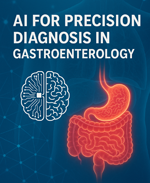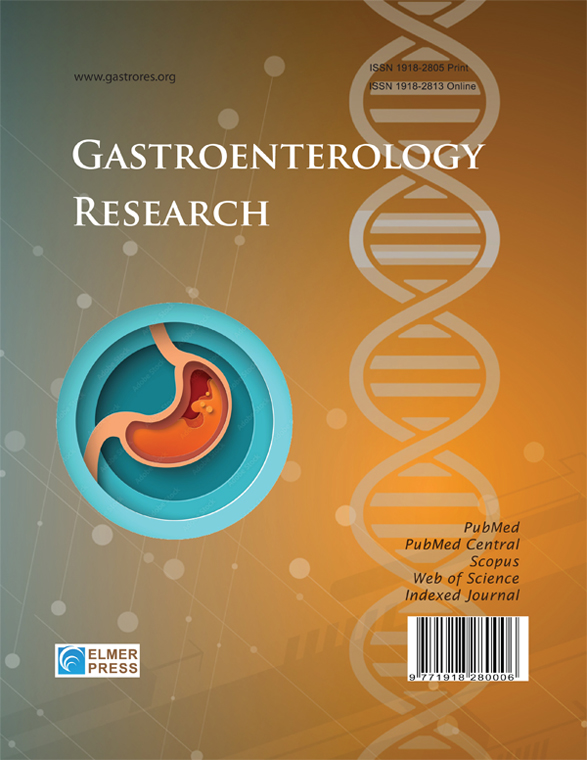Special Issue (Submission Deadline Dec 31, 2025)
Title: Explainable AI for Precision Diagnosis in Gastroenterology: From Algorithms to Clinical Adoption
The rapid evolution of artificial intelligence (AI) in medical imaging has opened  transformative possibilities for gastroenterology, enabling earlier detection, more accurate classification, and personalized management of gastrointestinal (GI) diseases. However, the clinical translation of these technologies faces significant challenges, particularly regarding the interpretability, trustworthiness, and real-world utility of AI-driven decisions. This Special Issue seeks to bridge this gap by highlighting cutting-edge research on Explainable AI (XAI) frameworks specifically designed for gastroenterology imaging, with a focus on translating algorithmic innovations into clinically actionable tools.
transformative possibilities for gastroenterology, enabling earlier detection, more accurate classification, and personalized management of gastrointestinal (GI) diseases. However, the clinical translation of these technologies faces significant challenges, particularly regarding the interpretability, trustworthiness, and real-world utility of AI-driven decisions. This Special Issue seeks to bridge this gap by highlighting cutting-edge research on Explainable AI (XAI) frameworks specifically designed for gastroenterology imaging, with a focus on translating algorithmic innovations into clinically actionable tools.
We invite contributions that address the intersection of advanced AI methodologies, domain specific clinical needs, and human-centric explainability in GI endoscopy, radiology, and pathology. The issue will serve as a comprehensive resource for researchers, clinicians, and regulatory experts working toward auditable, ethically aligned, and regulatory-compliant AI solutions for digestive health.
We encourage submissions (original research, reviews, and case studies) covering, but not limited to, the following themes:
Novel XAI Architectures for GI Imaging
- Interpretable deep learning models (e.g., attention-based CNNs, vision transformers) for endoscopic video analysis.
- Hybrid approaches combining symbolic AI with neural networks for lesion characterization.
- Uncertainty quantification methods to improve diagnostic reliability.
Clinical Validation and Benchmarking
- Comparative studies of XAI techniques (e.g., LIME, SHAP, Grad-CAM) in polyp detection, IBD scoring, or early cancer screening.
- Human-in-the-loop evaluation frameworks assessing clinician-AI collaboration.
- Multicenter trials validating XAI robustness across diverse populations and imaging devices.
Domain-Specific Challenges and Solutions
- Overcoming limitations in small-sample learning (e.g., self-supervised pretraining, few-shot adaptation).
- Multimodal fusion of endoscopy, histopathology, and omics data for explainable decision support.
- Real-time XAI systems for augmented endoscopy (e.g., AI-driven polyp size measurement).
Regulatory and Ethical Considerations
- Standardized reporting guidelines for XAI in gastroenterology (e.g., compliance with FDA/EMA/MDR).
- Bias mitigation strategies to ensure equity in AI-assisted diagnosis.
- Patient perspectives on AI explainability in GI care pathways.
Emerging Applications and Future Directions
- XAI for capsule endoscopy and functional GI disorder assessment.
- Federated learning approaches to preserve data privacy in XAI development.
- Generative AI (e.g., diffusion models) for synthetic data augmentation with interpretability.
Why Submit to This Special Issue?
This collection aims to:
- Provide a state-of-the-art synthesis of XAI’s role in addressing gastroenterology’s unique challenges.
- Highlight clinically validated frameworks that move beyond proof-of-concept to real-world deployment.
- Foster interdisciplinary dialogue among computer scientists, gastroenterologists, and policymakers.
Submission Guidelines
Submission Deadline: December 31, 2025.
Article Types Accepted: Original Research, Review Articles, Clinical Trials, Case Reports, Meta-analyses, Editorials.
Authors should submit their manuscripts through our online submission system and clearly indicate in the Cover Letter that the manuscript is for consideration in the Special Issue. All submissions will undergo standard peer review in accordance with the journal’s policies.
Guest Editor
Dr. Kelvin KL Wong, PhD , Prof. , FIEAust, FZaAS, SMIEEE
Department of Mechanical Engineering, Division of Biomedical Engineering, University of Saskatchewan, Saskatoon, Canada.
Prof. Dr. Kelvin KL Wong is a distinguished expert in medical image processing and computational science, who earned his Ph.D. from The University of Adelaide. With a strong academic background from Nanyang Technological University and The University of Sydney, he has been at the forefront of merging the fields of cybernetics and artificial intelligence (AI). He is widely recognized for introducing the term "Cybernetical Intelligence" published by John Wiley & Sons Limited, ISBN: 9781394217489. Dr. Wong's impactful research in AI has yielded significant achievements with the potential to positively impact humanity. As an internationally recognized biomedical engineering scientist and AI cybernetist, Dr. Wong was named among Stanford University's top 1.3% biomedical engineering researchers in 2020. He also reviews grant proposals for various research organizations such as the Swiss National Science Foundation. Leading a team of experts in AI, healthcare, disease management, and diagnosis, Dr. Wong's expertise has been instrumental in supporting government projects and initiatives in developing countries.
Dr. Kelvin KL Wong's current area of research lies at the forefront of medical image processing and computational science, where he continues to make pioneering contributions in the field of artificial intelligence (AI) and cybernetics. Dr. Wong has introduced a monumental advancement in AI technology. Deep Red, the world's first tool enabling modular programming through an intuitive GUI, revolutionizes neural network creation and training by eliminating the need for complex coding. This cutting-edge system empowers researchers and professionals, including medical practitioners and developers, to effortlessly design and customize deep learning models. Furthermore, Dr. Wong leads a team of experts specialized in AI, healthcare, disease management, and diagnosis. Their collective expertise has played a vital role in supporting government projects and initiatives in developing countries, particularly in Zambia. Prof. Wong's introduction of the African Telehealth Network (ATN) in Zambia addresses critical issues in chronic disease management, enhances healthcare delivery in rural areas, facilitates data-driven decision-making, and strengthens healthcare infrastructure. He was appointed Foreign Fellow of the Zambia Academy of Sciences (ZaAS) in 2024. In Addition, he is also a Fellow of the Institution of Engineers, Australia (IEAust) and Senior member of the Institution of Electrical and Electronic Engineering (IEEE).
Overall, Dr. Wong's current area of research spans a diverse range of cutting-edge technologies, including the pioneering concept of "Cybernetical Intelligence," and transformative applications in medical image processing and healthcare delivery. His relentless dedication to advancing AI for the betterment of society underscores the immense potential of his research to shape the future of various domains.










